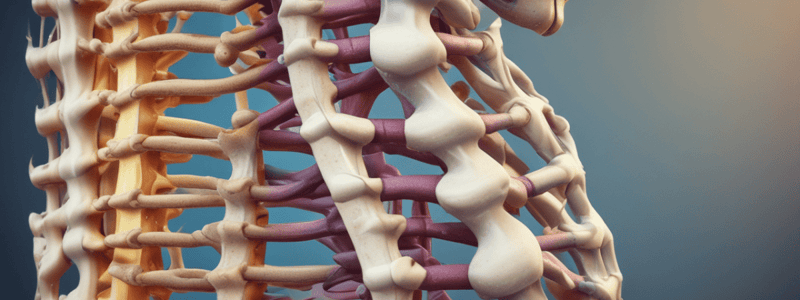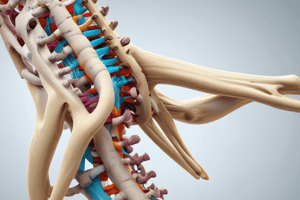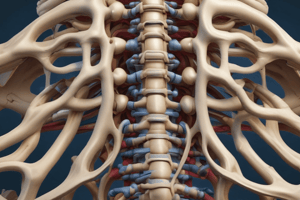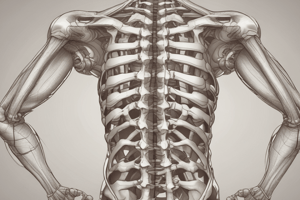Podcast
Questions and Answers
Bending Compression Bending causes only tension on the structures of the spine.
Bending Compression Bending causes only tension on the structures of the spine.
False (B)
In forward flexion, the anterior structures are only subjected to compression.
In forward flexion, the anterior structures are only subjected to compression.
False (B)
Tensile forces in the posterior structures help to promote extreme motion in flexion.
Tensile forces in the posterior structures help to promote extreme motion in flexion.
False (B)
In extension, the anterior structures are unloaded and the posterior structures are subjected to tension.
In extension, the anterior structures are unloaded and the posterior structures are subjected to tension.
Lateral bending causes compression in both sides of the disk.
Lateral bending causes compression in both sides of the disk.
Mechanical changes in the disk with creep loading do not result in large compressive and bending forces on the neural arch and ligaments.
Mechanical changes in the disk with creep loading do not result in large compressive and bending forces on the neural arch and ligaments.
Prolonged forces do not subject the apophyseal joints to large compressive and bending forces.
Prolonged forces do not subject the apophyseal joints to large compressive and bending forces.
The passive segment of the mobile segment in the vertebral spine is formed by the vertebra itself.
The passive segment of the mobile segment in the vertebral spine is formed by the vertebra itself.
The intervertebral disc is not part of the mobile segment in the vertebral spine.
The intervertebral disc is not part of the mobile segment in the vertebral spine.
The ligamentum flavum is found in the passive segment of the mobile segment in the vertebral spine.
The ligamentum flavum is found in the passive segment of the mobile segment in the vertebral spine.
The functional link between the anterior and posterior pillars of the vertebra is formed by the spinous processes.
The functional link between the anterior and posterior pillars of the vertebra is formed by the spinous processes.
Each vertebra in the motion segment has a trabecular structure involving the body and the arch forming a second-class lever.
Each vertebra in the motion segment has a trabecular structure involving the body and the arch forming a second-class lever.
The axial compression forces acting on the vertebral column are cushioned both directly and passively by the paravertebral muscles.
The axial compression forces acting on the vertebral column are cushioned both directly and passively by the paravertebral muscles.
Available movements at the interbody joints of the vertebral spine do not include rotation.
Available movements at the interbody joints of the vertebral spine do not include rotation.
The shift in load from the nucleus pulposus to the annulus fibrosus due to prolonged compressive forces mainly affects the anterior aspects.
The shift in load from the nucleus pulposus to the annulus fibrosus due to prolonged compressive forces mainly affects the anterior aspects.
Buckling or prolapse of the anulus fibrosus can be caused by decreased load due to prolonged compressive forces.
Buckling or prolapse of the anulus fibrosus can be caused by decreased load due to prolonged compressive forces.
Creep-induced elongation of supporting structures leads to increased stability in vertebral structures.
Creep-induced elongation of supporting structures leads to increased stability in vertebral structures.
The thoracolumbar junction has the lowest torsional stiffness among all vertebral regions.
The thoracolumbar junction has the lowest torsional stiffness among all vertebral regions.
Torsional stiffness is primarily provided by the inner layers of vertebral bodies and intervertebral disks.
Torsional stiffness is primarily provided by the inner layers of vertebral bodies and intervertebral disks.
In torsion, all annulus fibrosus fibers resist rotation in a clockwise direction.
In torsion, all annulus fibrosus fibers resist rotation in a clockwise direction.
The lumbar region is not effective in resisting torsion compared to other regions of the spine.
The lumbar region is not effective in resisting torsion compared to other regions of the spine.
Combining torsion with heavy axial compression and bending does not increase the risk of disk fiber rupture.
Combining torsion with heavy axial compression and bending does not increase the risk of disk fiber rupture.
Torsional forces are not part of coupled motions during axial rotation.
Torsional forces are not part of coupled motions during axial rotation.
Torsional stiffness is not affected by the orientation of the facets.
Torsional stiffness is not affected by the orientation of the facets.
The stiffness of the vertebral column is related to its ability to resist applied load
The stiffness of the vertebral column is related to its ability to resist applied load
The vertebral column is only subjected to bending during normal functional activities
The vertebral column is only subjected to bending during normal functional activities
Axial compression on the vertebral column occurs due to muscular contractions only
Axial compression on the vertebral column occurs due to muscular contractions only
Fluid is expressed from the nucleus pulposus and the annulus fibrosus under compressive loading
Fluid is expressed from the nucleus pulposus and the annulus fibrosus under compressive loading
The fluid expressed from the nucleus pulposus and the annulus fibrosus is absorbed through large openings in the cartilaginous end plate
The fluid expressed from the nucleus pulposus and the annulus fibrosus is absorbed through large openings in the cartilaginous end plate
A person is taller in the evening compared to morning due to compressive forces on the vertebral column
A person is taller in the evening compared to morning due to compressive forces on the vertebral column
The ability of the vertebral column to resist loads is independent of a person's age and posture
The ability of the vertebral column to resist loads is independent of a person's age and posture
Flashcards are hidden until you start studying




